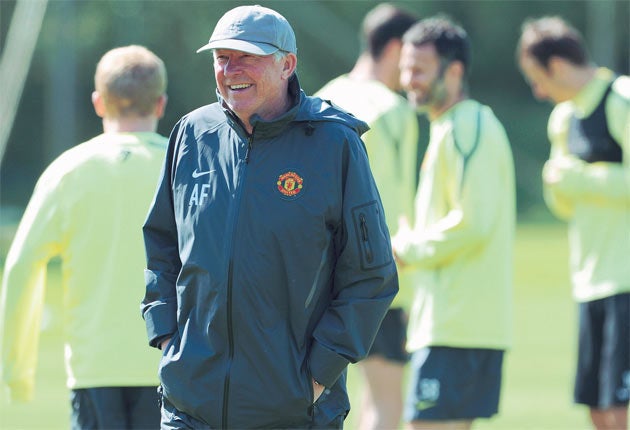Time for Sir Alex Ferguson to consider new goals - for the sake of his wellbeing

Your support helps us to tell the story
From reproductive rights to climate change to Big Tech, The Independent is on the ground when the story is developing. Whether it's investigating the financials of Elon Musk's pro-Trump PAC or producing our latest documentary, 'The A Word', which shines a light on the American women fighting for reproductive rights, we know how important it is to parse out the facts from the messaging.
At such a critical moment in US history, we need reporters on the ground. Your donation allows us to keep sending journalists to speak to both sides of the story.
The Independent is trusted by Americans across the entire political spectrum. And unlike many other quality news outlets, we choose not to lock Americans out of our reporting and analysis with paywalls. We believe quality journalism should be available to everyone, paid for by those who can afford it.
Your support makes all the difference.Stepping down from a job is a challenge for mere mortals - the loss of status, structure and income can have a grave psychological impact. For a football god it will be much harder.
Football and Manchester United are in Sir Alex's veins. They are what has got him up in the mornings. He is not only a legendary manager, he sees himself that way. He has power beyond the dreams of most chief executives, a TV channel devoted to his doings and a global following.
To go from a full-on job, with heavy responsibility and huge expectations, in which everyone wants to talk to him and everyone wants to know what he is planning to "pouring a glass of sherry and watching the dahlias grow" as psychotherapist Phillip Hodson puts it, will require an effort of transformation.
"I do foresee a period of maladjustment. There are a lot of managers whose names no one can remember. Sir Alex is larger than life. But fame is a wasting asset - spent twice as fast as ordinary cash," Mr Hodson, a fellow of the British Association for Counselling and Psychotherapy, said.
Sir Alex has long feared retirement, after seeing what it did to his Dad. "My father retired on his 65th birthday and one year later he was dead," he has said. It is what has kept him on the touchline despite having a heart pacemaker fitted in 2004.
Heart problems are not uncommon among football managers but the fact that he managed to maintain his punishing work rate for almost a decade suggests he is not in imminent danger.
The loss of status and of purpose he will face must be the bigger worry. It leaves people bereft.
"He has got to do what we all have to do - re-commit to family and realise that time is not infinite. Having won 49 trophies he has got to think outside the footballing box and consider what other goals he has," Mr Hodson said.
Traditional retirement, in which work ceased abruptly on a man's 65th birthday, is less common today. It has been replaced by "blended" retirement - a gradual withdrawal in which people carry on doing things but less intensely. Sir Alex is to continue as a director of United. Will that work?
Mr Hodson said: "If you are used to being the general it is very difficult to adjust to being the officer."
Join our commenting forum
Join thought-provoking conversations, follow other Independent readers and see their replies
Comments